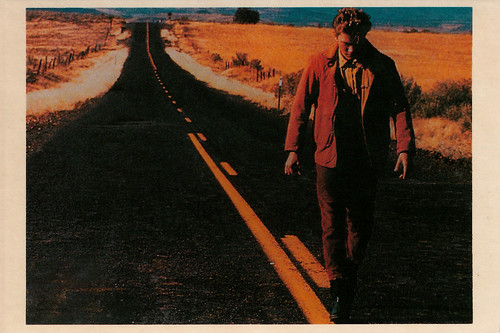
British postcard, no. PC0479. River Phoenix in My Own Private Idaho (Gus Van Sant, 1991).

British postcard by Heroes Publishing LTD, London, no. SPC2618. Photo: Lance Staedler, 1987.
The penniless archbishop of Venezuela and the Caribbean
River Phoenix was born River Jude Bottom in 1970, in a log cabin on a mint farm in Madras, Oregan. He was the first child of Arlyn Dunetz and John Bottom. His parents named him after the "river of life" that flowed through Hermann Hesse's novel 'Siddhartha' and for the Beatles' song 'Hey Jude'.
From the time Phoenix was born, his parents lived the hippie life, moving to several communes until they joined the controversial Children of God cult. They became missionaries for their new church and spent a couple of years wandering Latin America before landing in Venezuela. Phoenix never attended formal school.
Along the way, three more children were born: Rain, Joaquin Rafael (who grew up to be actor Joaquin Phoenix), and Libertad Mariposa. Though John Bottom had been designated the "Archbishop of Venezuela and the Caribbean," he and his family received no missionary funds from their church and lived in poverty. Phoenix and his siblings often sang and performed on street corners for food.
His family hit their lowest point when Phoenix was seven and the penniless brood was forced to move into a beach hut until a local priest showed mercy and arranged for them to be stowed away on a Florida-bound freighter. The crew discovered the family during the voyage but treated them kindly.
Shortly after their arrival in Florida in 1978, the family legally changed its name to Phoenix, after the mythical bird that rises from its own ashes, symbolising a new beginning. While the family was in Florida, another child, Summer Joy Phoenix, was born.
River Phoenix had originally wanted to be a musician and did not become interested in acting until 1979 when he and Rain were spotted in a talent show and invited to audition at Hollywood's Paramount Studios. Believing that the opportunity was worth more than the possible risks involved, the Phoenix family headed West in a battered station wagon.
Their arrival in Burbank was disappointing, as the Paramount people reneged on what the family had believed to be an offer to audition the children. Once again the family was destitute and the children returned to busking for change. Matters improved when agent Iris Burton spotted the four children singing for spare change in Westwood, Los Angeles, and was so charmed by the family that she soon represented the four siblings. She started finding work for Phoenix in television commercials and in series such as Real Kids (1980), for which he and Rain worked as a warm-up act.
Phoenix's first real break came when he won a leading role in the TV series Seven Brides for Seven Brothers (1982) with Richard Dean Anderson. From there, he made guest appearances on such television series as Family Ties and in such TV movies as Robert Kennedy: The Man and His Times (Marvin J. Chomsky, 1985) in which he played Robert Kennedy Jr., and Brad Davis Kennedy's father.

Vintage postcard, no. 1029.
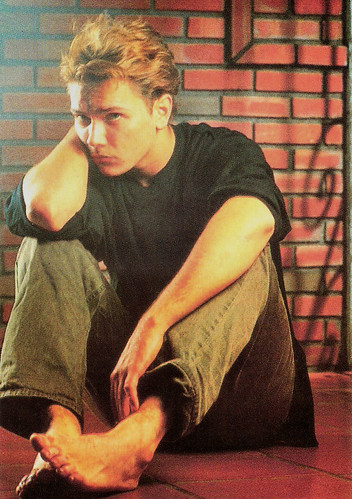
French postcard, Réf. 926.
A stunningly sensitive performance, poignant and comic at once
River Phoenix made his feature-film debut as geeky boy-scientist Wolfgang Müller in the Science-Fiction Fantasy Explorers (Joe Dante, 1985). The film, which also starred a debuting Ethan Hawke, was not a tremendous box-office success, but Phoenix received favourable notices.
He earned even more acclaim in the bittersweet coming-of-age story Stand By Me (Rob Reiner, 1986), based on the novella 'The Body' by Stephen King. The same year, he played opposite Harrison Ford in The Mosquito Coast (Peter Weir, 1986).
By the late 1980s, Phoenix found himself a top-ranked teen idol, having added films like Running on Empty (Sidney Lumet, 1988), Little Nikita (Richard Benhamin, 1988) with Sidney Poitier, and Indiana Jones and the Last Crusade (Steven Spielberg, 1989) to his resumé.
Harrison Ford personally recommended him for the part of the young Indy in Indiana Jones and the Last Crusade (1989) after working with him on The Mosquito Coast (1986). For his part in Running on Empty, he was nominated for an Oscar for Best Supporting Actor and a Golden Globe and received the Best Supporting Actor honor from the National Board of Review.
Phoenix met Keanu Reeves while Reeves was filming Parenthood (Ron Howard, 1989) with Phoenix's brother, Joaquin. Phoenix had reportedly auditioned for the part of Bill in Reeves' Bill & Ted's Excellent Adventure (Stephen Herek, 1989) before the role was taken by Alex Winter. The two starred together for the first time in I Love You to Death (Lawrence Kasdan, 1990).
His breakthrough as an adult actor came when he was cast as a narcoleptic street hustler opposite Reeves in My Own Private Idaho (Gus Van Sant, 1991). In his review for Newsweek, David Ansen praised Phoenix's performance: "The campfire scene in which Mike awkwardly declares his unrequited love for Scott is a marvel of delicacy. In this and every scene, Phoenix immerses himself so deeply inside his character you almost forget you've seen him before: it's a stunningly sensitive performance, poignant and comic at once".
For his role, Phoenix won Best Actor honors at the Venice Film Festival, the National Society of Film Critics, and the Independent Spirit Awards. The film and its success solidified Phoenix's image as an actor with edgy, leading man potential. Allegedly, it was during the production of that film that Phoenix started taking drugs. Before his death, he won further acclaim for roles in the romantic coming-of-age drama Dogfight (Nancy Savoca, 1991) and the espionage thriller Sneakers (Phil Alden Robinson, 1992) with Robert Redford and again with Sidney Poitier.

British postcard by Santoro Graphics Ltd., London, no. C 297.
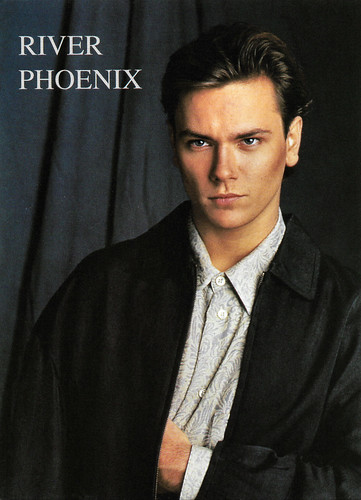
English postcard by Heroes Publishing Ltd., London, no. SPC 2728.
A drug-induced heart failure on the boardwalk outside of the Viper Room
River Phoenix was a dedicated animal-rights activist and environmentalist, and a strict vegetarian, and a member of PETA (People for the Ethical Treatment of Animals). He was also a talented musician. He had played guitar, sang, and wrote songs for his band, Aleka's Attic, which also included his sister Rain Phoenix, while living in Gainsville, Florida.
He sang and played guitar in the country music-themed film The Thing Called Love (Peter Bogdanovich, 1993), the last completed picture before his death. On the set, Phoenix began a relationship with co-star Samantha Mathis.
In late October 1993, Phoenix returned to Los Angeles, only there for 1 day, after flying back from 1 week in New Mexico and before that 6 to 7 weeks in Utah to complete the three weeks of interior shots left on his last project, the American-Dutch thriller Dark Blood (George Sluizer, 1993-2012), with Judy Davis and Jonathan Pryce.
On the evening of 30 October 1993, Phoenix was to perform with the band P; which featured his good friends Johnny Depp, Flea from the Red Hot Chili Peppers, Gibby Haynes of the Butthole Surfers along with Al Jourgensen of Ministry at The Viper Room, a Hollywood nightclub partly owned at the time by Depp.
Later that night Phoenix died of drug-induced heart failure on the boardwalk outside of the Viper Room in the company of Mathis, his sister, Rain, and his brother, Joaquin. He was only 23. Joaquin Phoenix and his partner Rooney Mara later named their son, River, after him.
After 19 years, River's last film, Dark Blood, was finally completed in 2012. For the 2012 release, roughly four to six missing scenes were replaced with director George Sluizer providing narration. It was revealed in October 2011 that Sluizer had held onto the footage, fearing it would be destroyed, and that he had re-edited the material and believed that with some adjustments a completed film could be released. In 1999 the insurance company that owned the negatives wanted to stop paying storage costs, so they considered having the film destroyed. Sluizer entered the storage area that held the negative and removed it.
Geoffrey Macnab from The Guardian: "Dark Blood is fragmentary, uneven and downright odd in parts but it also has huge curiosity value. The director's solution for bridging the considerable gaps is to read out descriptions of what is missing. It's a simple but surprisingly effective tactic. His narration ensures that the film is just about coherent. (...) Phoenix brings a wild physical energy to his role – in truth, his character verges on the preposterous but Phoenix tackles it with such commitment that he just about keeps absurdity at bay."

English postcard, no. MM377.
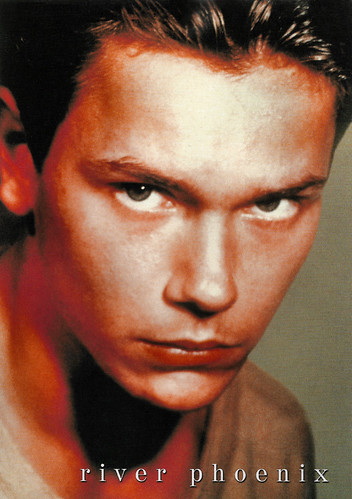
British postcard by Pyramid, Leicester, no. PC0088, 2000.
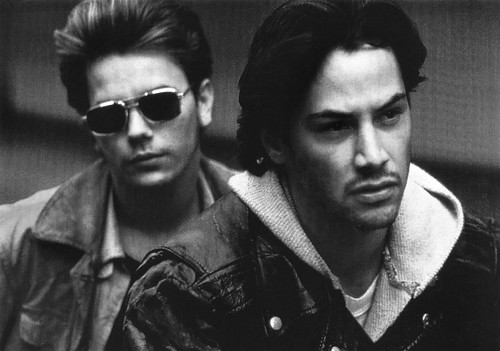
French postcard, no. 1035. Photo: River Phoenix and Keanu Reeves in My Own Private Idaho (Gus Van Sant, 1991).
Sources: Sandra Brennan (AllMovie), Geoffrey Macnab (The Guardian), Wikipedia, and IMDb.
No comments:
Post a Comment